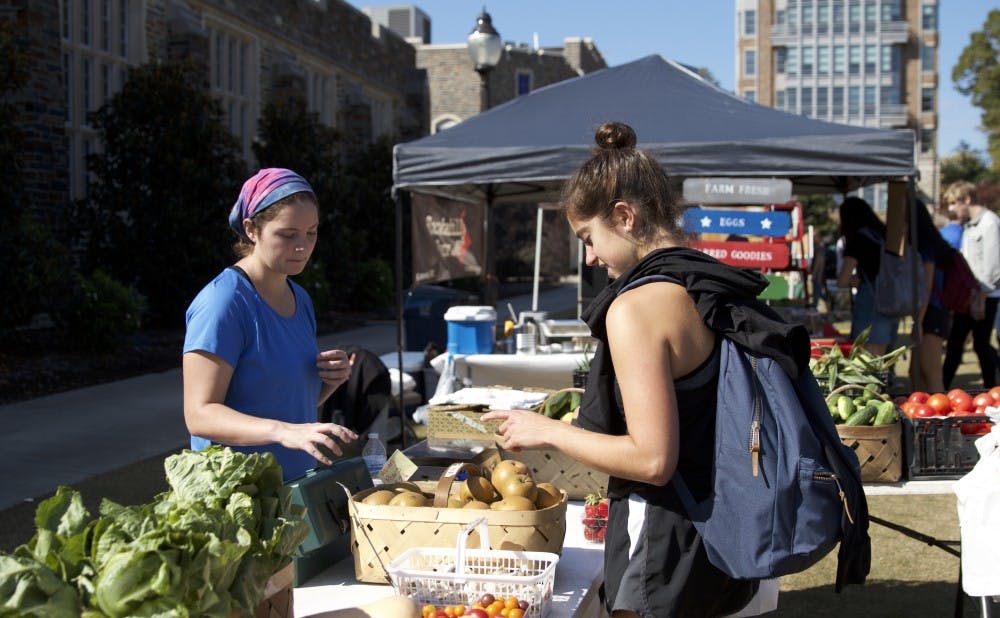On a hot, sunny afternoon in early November, tents lined Krzyzewskiville as music streamed from a speaker. But it wasn’t a game day. While it was nowhere near as loud or boisterous as the hours leading up to a football or basketball game, the area did hum with activity surrounding the K-Ville Farmers’ Market Friday. Students swept through the area and milled about with friends, pausing when a table caught their eye and often carrying on conversations with the local farmers who displayed their wares.
The tables were covered in locally-sourced produce of all kinds, from bright red tomatoes, crisp green beans and still-in-the-husk corn to farm-fresh eggs, flavored goat cheeses and jars of jam. One vendor sold granola made from scratch. Another touted pastries, both savory and sweet. All were local North Carolina farmers.

Signs around the space proclaimed the importance of local foods for sustainability. Rebecca Hoeffler, program coordinator for Sustainable Duke, said Duke Dining does an “incredible” job of sourcing foods locally, and the goal of the farmers’ market was to promote that sustainability. She said the market allowed students to access food directly from the farmers and encouraged them to take similar sustainable actions in the future.
The K-Ville Farmers’ Market was also tied to the Duke Healthy Campus initiative, which aims to build health through five key areas, including food and nutrition.
“If you sleep right, eat right, drink right, you’re going to be able to wake up each day ready to tackle a new problem,” Hoeffler said. “That is definitely something we’re trying to push, and healthy food is a way to get there.”
This market was a couple months in the works, with collaborative planning efforts from members of Duke Student Government, Campus Enterprises and Sustainable Duke. The planning took two separate but somewhat parallel paths before the groups all linked together.

Sophomore Jared McCloskey, co-director of Next Ventures for Campus Enterprises, started thinking about the idea as a result of talking to a friend who had heard about a farmers’ market at Georgetown University. He then found out that LIVE FOR LIFE, Duke’s employee wellness program, actually does host one near the hospital, in an area that is less visible and less accessible for students. It also only runs from late April through September.
McCloskey contacted the organizer of that market, Cassandra Callas, and she gave him contacts for the 15 vendors that attend the LIVE FOR LIFE market. He then started looking into a location, landing on K-Ville through talks with Robert Weiseman, Duke’s Director of Athletic Facilities, as well as discussions with Parking and Transportation.
The market was also something that junior Kristina Smith, vice president of services and sustainability for Duke Student Government, had been thinking about for a while.
“It was one of the things on my platform that I felt the most passionate about, something that I think would be really really great to bring to campus for students to have access to,” Smith said.

After she was elected, she began working with Sustainable Duke, an organization that focuses on environmental stewardship and sustainability on campus. They were also inspired by LIVE FOR LIFE’s farmers’ market. Initially, these groups intended to have the market on the Bryan Center plaza, but they quickly realized that was unfeasible.
Junior Sean Bissell, vice president of academic affairs for DSG and vice president for growth and data analysis for Campus Enterprises, noticed the two were both working towards a similar goal and brought the groups together. Students from each group then met with Hoeffler to talk about the event and solidify details.
The collaboration of all three groups came to fruition Nov. 3. Smith said the process of planning went fairly smoothly, but that it was still a big undertaking. McCloskey said the most difficult parts for him included explaining to Weiseman, Parking and Transportation and vendors why they wanted to have the farmers’ market and convincing these groups that they could truly make it happen.
“This is the first time that I’ve done something to this scale,” McCloskey said. “The project that I did in high school, that was somewhat similar, but it’s nothing like with the amount of communication and effort and management put into this.”
While that high school project was based around agriculture, it focused on the process of farming rather than the hosting of an event. McCloskey also spent three weeks of the past summer working on a farm, which he said was “crucial” to his work on the farmers’ market because it taught him how the farms were run, which helped him to connect with farmers for the market.

The three groups hope to now make the farmers’ market a recurring event, something that students will have access to throughout the year. They plan to start work on that soon, continuing to meet the demand for fresh, local produce and increase campus sustainability.
“Sustainability can be coined as this unnamed movement,” Hoeffler said. “Because it relates to so many different movements and it’s really commonality between humans wanting to create a livable future for not only ourselves but future generations.”
Get The Chronicle straight to your inbox
Signup for our weekly newsletter. Cancel at any time.

